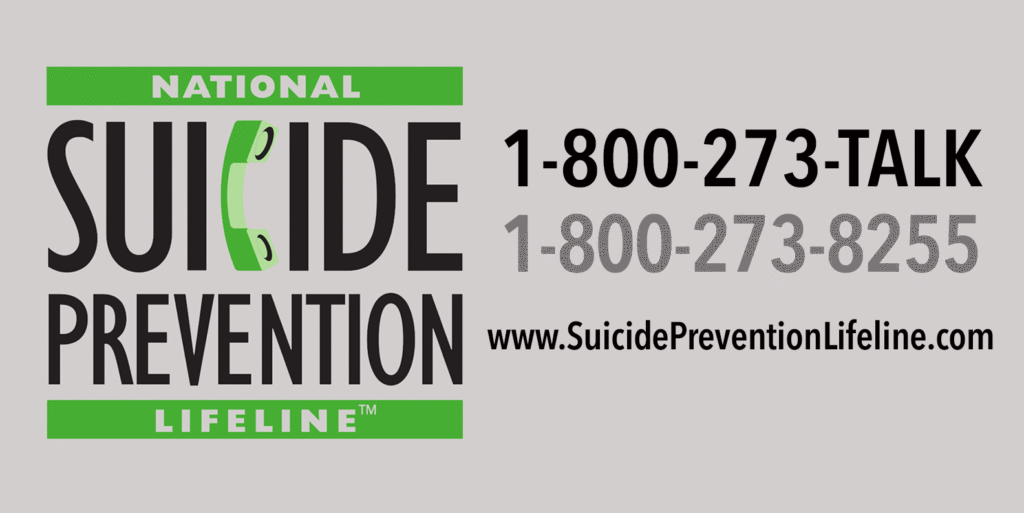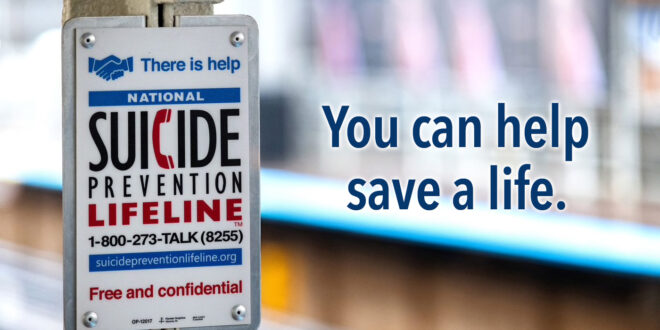EDITOR’S NOTE: In these critical times of the novel coronavirus pandemic, there are people worldwide who are considering suicide.
Today, everyone can play a role in Suicide Prevention.
Call or Share this toll free number to chat with a lifeline member…
1-800-273-TALK (8255)
What is the one thing most people who contemplate suicide need, more than anything else? Someone to talk to.
We can all help prevent suicide. If we can’t be there for someone, especially with a trained voice of counsel, we can encourage others who need this help to call this special organization.
The National Suicide Prevention Lifeline (NSPL) provides free and confidential support for people in distress, prevention and crisis resources for you or your loved ones, and best practices for professionals.
The Lifeline is a national network of local crisis centers throughout the U.S. that provides free and confidential emotional support to people in suicidal crisis or emotional distress 24 hours a day, 7 days a week. They’re committed to improving crisis services and advancing suicide prevention by empowering individuals, advancing professional best practices, and building awareness. They understand that every struggle is different.

Suicide is not inevitable for anyone. By starting the conversation, providing support, and directing help to those who need it, we can prevent suicides and save lives. Evidence shows that providing support services, talking about suicide, reducing access to means of self-harm, and following up with loved ones are just some of the actions we can all take to help others.
By offering immediate counseling to everyone that may need it, local crisis centers provide invaluable support at critical times and connect individuals to local services.
Know the Risk Factors – click here >
Know the Warning Signs
Some warning signs may help you determine if a loved one is at risk for suicide, especially if the behavior is new, has increased, or seems related to a painful event, loss, or change. If you or someone you know exhibits any of these, seek help by calling the Lifeline.
• Talking about wanting to die or to kill themselves
• Looking for a way to kill themselves, like searching online or buying a gun
• Talking about feeling hopeless or having no reason to live
• Talking about feeling trapped or in unbearable pain
• Talking about being a burden to others
• Increasing the use of alcohol or drugs
• Acting anxious or agitated; behaving recklessly
• Sleeping too little or too much
• Withdrawing or isolating themselves
• Showing rage or talking about seeking revenge
• Extreme mood swings
Get stories from people who have been through a crisis and found hope.
After 9/11, Michael Liguori joined the Marines to fight for his country. When he returned, he struggled with PTSD and attempted suicide. This is his story. “I want to share this with you because life is complicated, hard and often, a constant struggle. But that doesn’t mean you have to do it alone.” – click quote to read more
Musician Rhett Miller shares his suicide attempt story (below) and why he’s glad the Lifeline is here to help. “I was able to come through it and carve out a life that I love.”
Experience the stories of people like you, and how they overcame crisis to find hope and recovery.
Get help now.
Get resources for yourself or be the difference for a loved one by offering support and understanding.
Help your local center.
Lifeline centers range across the US and rely on state and local funding to operate. Period
Join the network.
Local crisis centers can support the fight against suicide by joining the lifelines national network.
Promote the lifeline.
Spread the word about the lifelines free, confidential, 24/7 services and raise awareness for suicide prevention.
Call this toll free line to chat with a lifeline member… 1-800-273-8255
If you’re in crisis, there are options available to help you cope. You can also call the Lifeline at any time to speak to someone and get support. For confidential support available 24/7 for everyone in the United States, call 1-800-273-8255.
How Can You Help Yourself?
Healing, hope and help can happen. Here are some ways to help you get through a crisis.
We Can All Help Prevent Suicide by SHARING…
Share on Facebook
Share on Twitter
Share with Email
Understanding the issues concerning suicide and mental health is an important way to take part in suicide prevention, help others in crisis, and change the conversation around suicide.

Thank you from the bottom of our hearts.
EDITOR’S NOTE: HERE IS WHY THIS SUBJECT IS SO IMPORTANT TO US. Back in 2002, not long after my mother passed away, I got an email from a young woman who stated, “Your ecards and stories helped me convince my brother not to kill himself.” I was blown away by that testimonial. She went on to say she would send him an uplifting card or story every day, along with her words of encouragement. He was in another country and had a wife and two children. After about three weeks, he sought counseling with a priest and got medical help and committed to restructuring his life. In case you’re wondering, the story that pulled him up and out of his depression was, “The Mountain Climber,” which was installed the first year of inspire21.com. You can see “The Mountain Climber” short story here, if you like >




